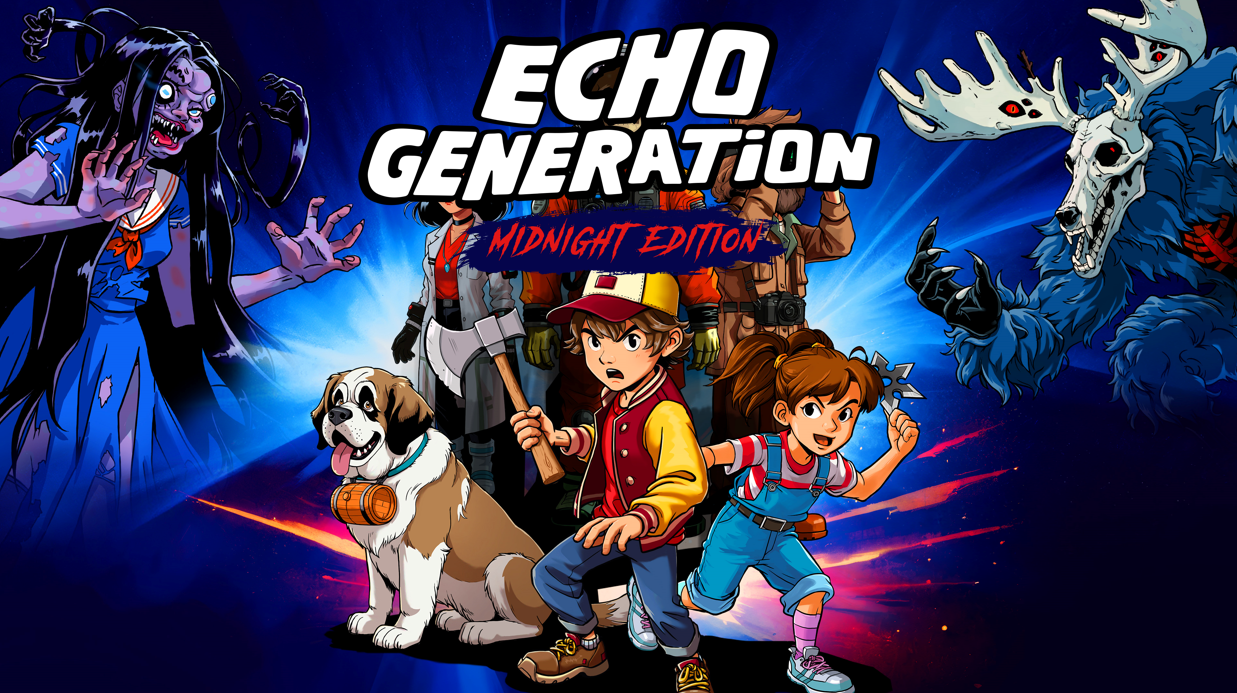With an undeniably cute and detailed voxel aesthetic, Echo Generation made a splash in 2021 mixing Stranger Things cool with a vibrant old-school adventure game structure. It sounded wonderful to someone who grew up in the ’90s with pixels and text-based adventures on an old school PC. I mean an actual school PC, that was old. Here at Finger Guns Sean praised Echo Generation’s visuals and fun overall style, but lamented the unfocussed narrative and lack of a quest log to keep track of all the back-and-forth item searching.
Three years later and Echo Generation is rebounding off a nearby wall with the Midnight Edition, a supped-up version of the same game with added flux capacitors. Will this enhanced version fix the issues the game had the first time around? Will it play better, sound better and crucially log its quests better? And is midnight really the best time to start your gaming session? You’ve got school in the morning, kid.
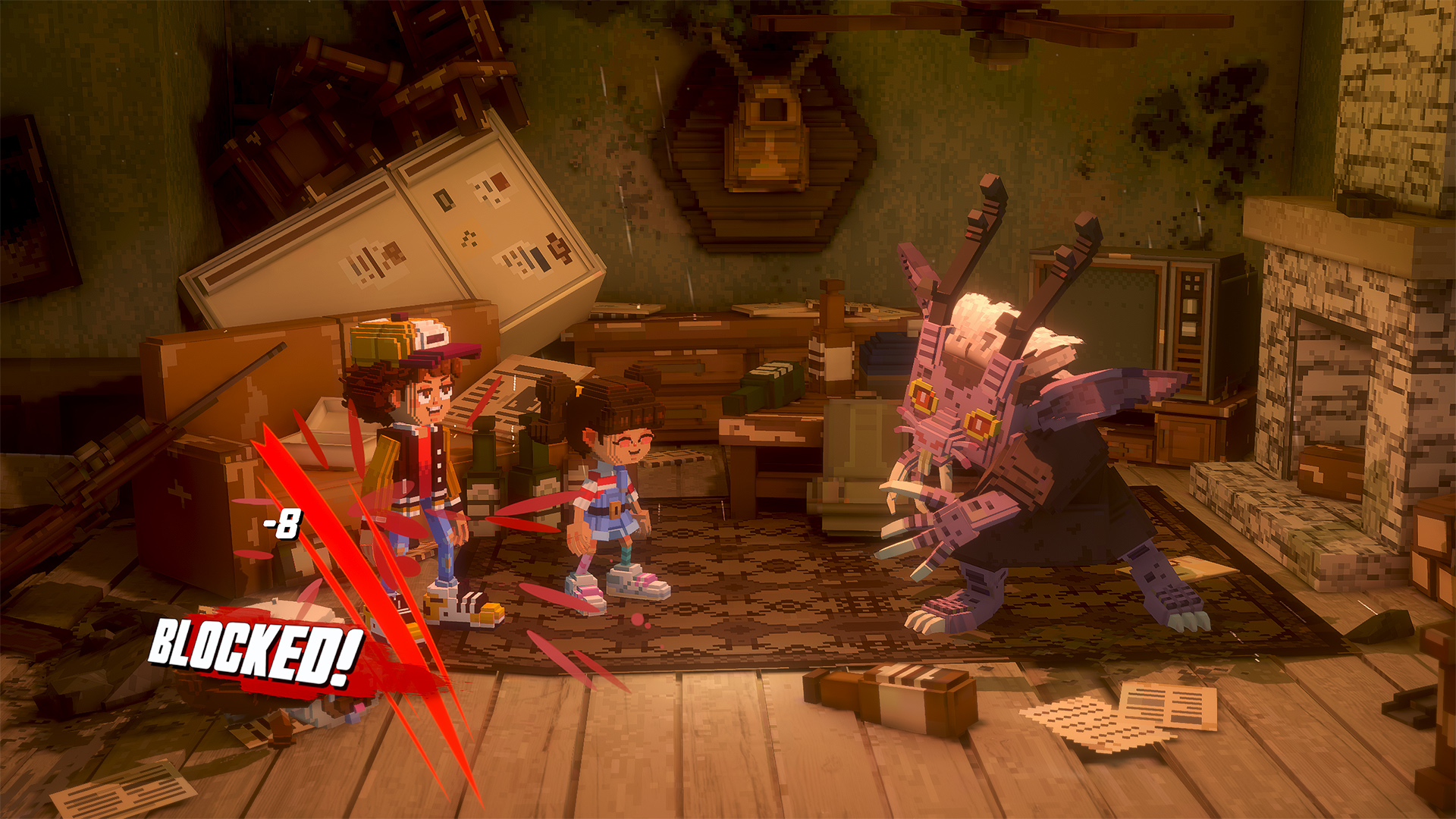
Millennials
You play as a cookie-cutter preset eighties kid, one of some ten or so to choose from. Nameless and for the most part a caricature/amalgamation of eighties kid tropes with virtually no backstory. It’s summer, school’s out and you’ve got the whole town, and all its environs to get lost in. Except mum wants you to take your sister with you. Jeez.
She’s not so bad, and handy in a fight. You and sis explore a little interconnected quasi-open world of locations from the safe suburbs, the school and downtown, to eerie cemeteries, forest clearings, junkyards, and abandoned train tracks. Each has NPCs who will give you items, and small get-this-for-me type quests revolving around finding the right item. Like a classic point-and-click, each item you find will be the most important thing ever for someone else you meet somewhere else, and they will give you a key, or a screwdriver, or a quantum processor, which will answer some other NPC’s issues you encountered an hour ago.
Back and forth, back and forth across town, ad nauseam. It’s not the most engaging gameplay loop in the modern age, but it’s nicely done and evoked the right period of games for me. All this item finding is broken up by an eighties horror flick pantheon of enemies and villains – alien squids, junkyard monsters, ghouls, school principals and animatronic puppets – that you must fight in quirky, highly interactive turn-based battles.
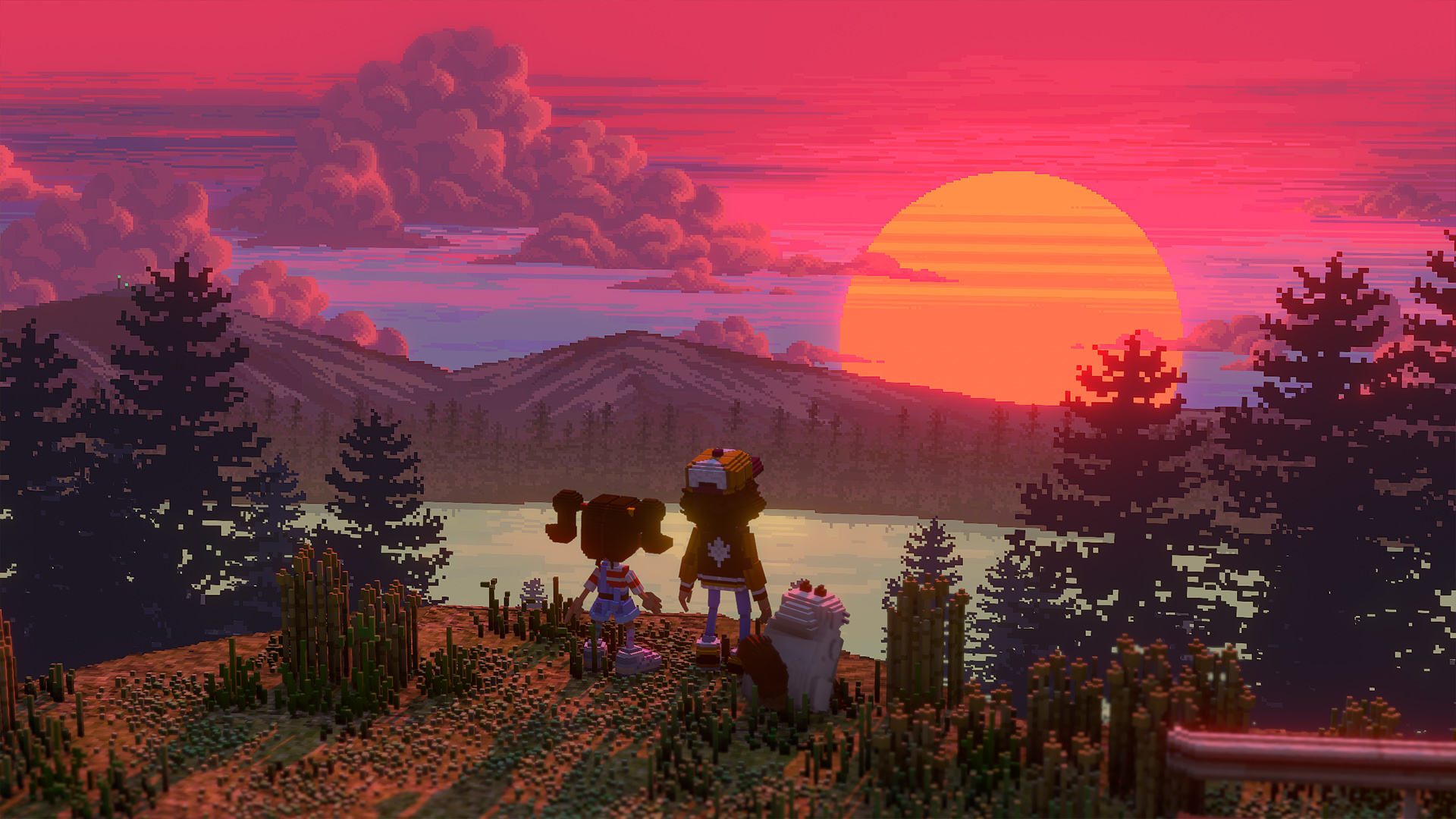
Pepsi Generation
Stats-wise, it’s a very simplistic system. The RPG elements are kept to literally HP, strength and skill points, which you can level up with a bit of EXP. With only 5 hours or so of run-time, you won’t be hitting high-digit levels or needing to do any real stat or skill management. For the most part, I never had to grind out levels either – there’s a fair balance of difficulty unless you venture into the wrong areas too early.
You, your sister and one pet (of five to find as you play) face off against the jumble of monsters. You can do basic attacks that slowly fill a skill point tally, and you can use that same skill point tally to bust out stronger moves you earn as you complete quests. Most of these stronger moves require timed button presses, tiny minigames, or joystick waggling to power up and be used to their highest potential. If you miss for example, they often do only half the damage they could have. Even the basic attacks and basic blocks have timed button prompts, which made every battle interactive in a fun way, and kept me engaged. The caveat there is this works in a five-hour game. In a much longer RPG, this constant interaction in the turn-based battles could get tedious.
Back to the story issues. You fight these creatures, but there’s no explanation of the space squid, the huge scrap robot monster, the haunting in the school, or any other episodes. There’s no all-encompassing Upside Down underneath this Hawkins-esque town, giving explanation to each strange happening. Instead, it feels like a disjointed collection of eighties horror movie scenes and locales, thrown at the wall to see which would bounce back. At one point I wasn’t even certain they weren’t all the vivid imagination of my avatar.
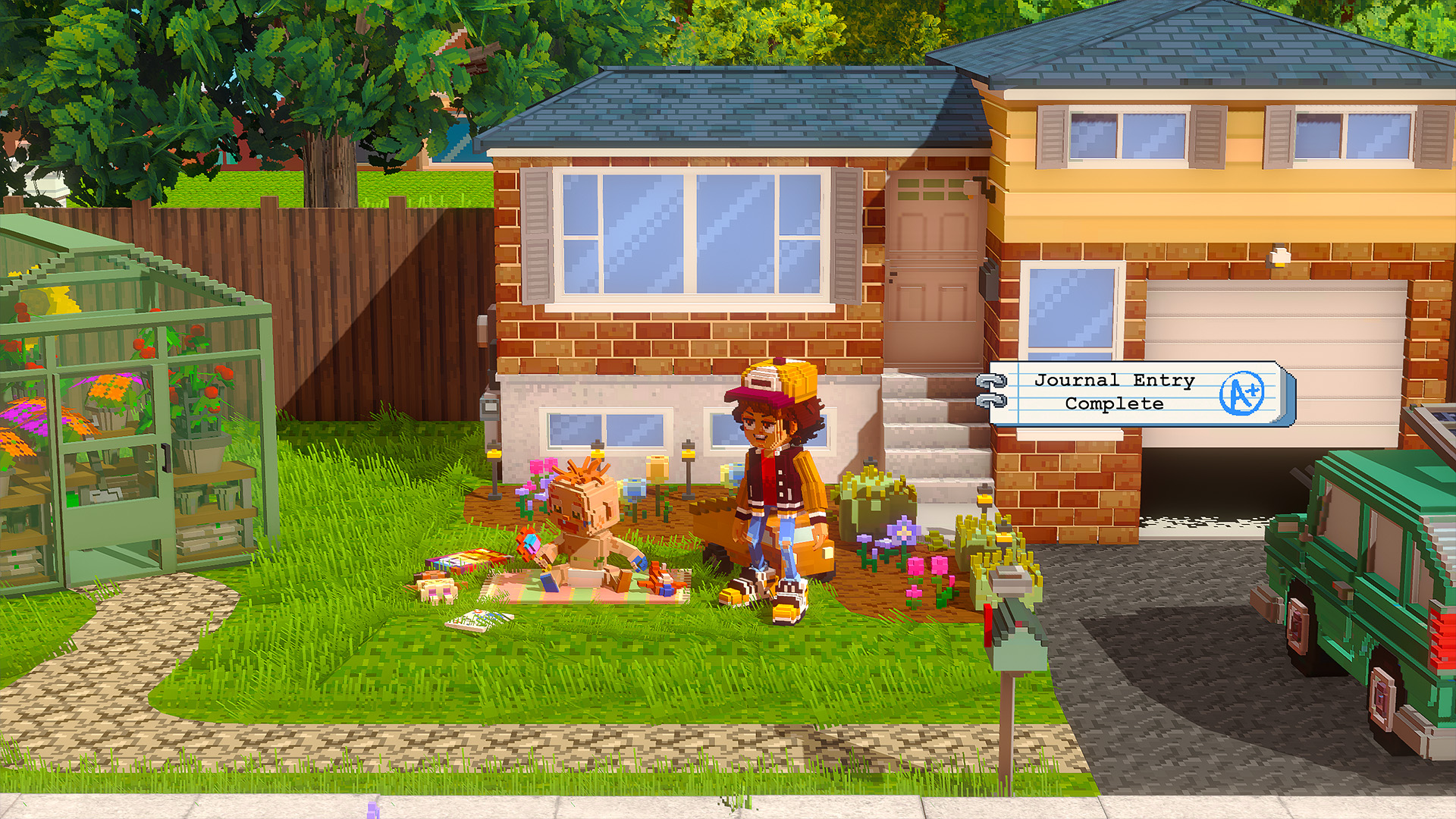
Echo Location
Plot lines don’t pan out – for example, you work to get the items needed to open the tree house full of kids, get a bus pass to get downtown where your friends are hanging out at the video rental shop, or save the kid trapped in someone’s basement, all the while every kid is talking about the horror film you’re going to make this summer. But then the plot never continues. You do experience aspects of a horror movie, or ten, but you never go and get the camera equipment one of the kids needed to get, and it never reaches the night they were going to film. It’s all just left dangling and incomplete. Same with the presence of the police, FBI and serial killer, they just kind of fizzle into nothing.
The only one that slowly builds to anything is the very subplot-feeling story of your father being absent and that you might be able to reach him if you can get a portal working. The only real exposition in the game revolves around him and what happened when he disappeared. Without trying to spoil anything, when it all goes aliens, spaceships and making contact, you are building to that plot’s payoff, and that one only.
Echo Generation has some of the most wonderful voxel graphics I’ve ever seen, and the Midnight Edition is no slouch. Voxel style clearly translates nicely to almost any system, and there’s no noticeable issues playing this on the Switch. It is a vibrant colourful game, full of atmospheric little locales, gorgeous areas and some really fun animations and NPCs. Each area has its own signature synthy soundtrack, and I really liked the five cassettes you can find through the game, which actually helped a few quest lines play out.
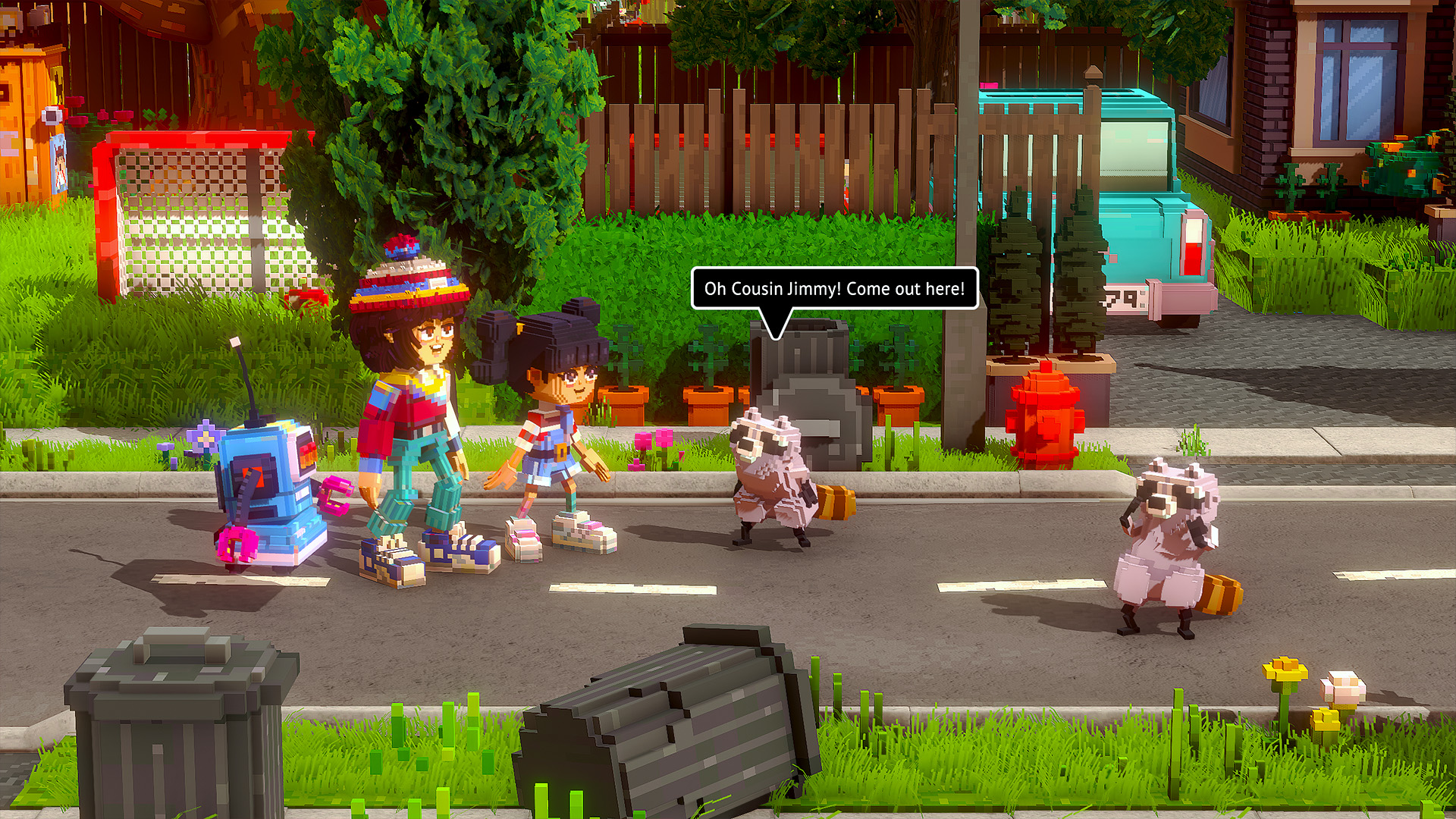
Children of the Corn
So what are the new features? Well, they are like a list of answers to all the issues we had with the game the first time around. Cococucumber seemingly listens to its players and learned a lot more making Ravenlok, so came back to perfect Echo Generation. Graphics have been appropriately sharpened, combat is a little faster, and from what I can tell a little more forgiving. Pets gain levels when they first join your team, rather than starting off at level one. There’s now the inclusion of a fast travel system where you can open up pay phones to teleport between areas, which dramatically cuts down on the hiking back and forth, and therefore the playtime. Instead of circa 8 hours or so, the game can be done relatively comfortably in about four or five hours.
The biggest help to this is an efficient, though not over-the-top quest log. You now have a journal that keeps track of each item you’ve been given a clue or request for, and ticks them off when they are attained, and when they are correctly traded or used. One of our biggest gripes with the original was how difficult it made itself to play, without these modern time- and brain-savers. Who can keep track of every item and where it is needed in a game with this many of them? Thankfully no one has to anymore.
So is it better? Well, basically it has to be better right? Issues have been fixed, the game has been streamlined and polished. However, not everything can be fixed this way. The fundamental narrative issues remain, in that Echo Generation just feels disjointed, like a series of episodic tropes and no coherent plot tying any of it together. The Midnight Edition does not come with an improved plot. Threads and promises of later scenes are left hanging everywhere and only one story, one that seems very secondary, is the one that actually comes to any kind of climax.
Upgraded graphics, fast travel, and a slew of quality-of-life upgrades that track items and improve combat flow, make Echo Generation Midnight Edition the definitive version. However, they feel like incremental gains rather than a wholesale re-evaluation, as the base game remains largely unchanged.

Echo Generation Midnight Edition is available June 19th on Nintendo Switch (review platform), and PC via Steam.
Developer: Cococucumber
Publisher: Cococucumber
Disclaimer: In order to complete this review, we were provided with a promotional copy of the game. For our full review policy, please go here.
If you enjoyed this article or any more of our content, please consider our Patreon.
Make sure to follow Finger Guns on our social channels –Twitter, Facebook, Twitch, Spotify or Apple Podcasts – to keep up to date on our news, reviews and features.
